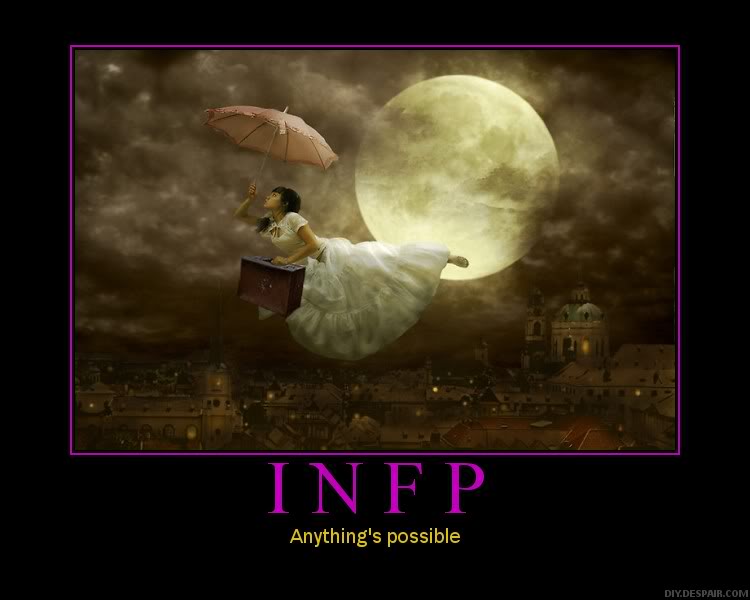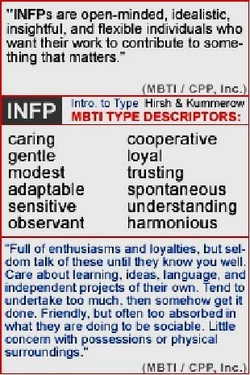Which hits some nails on spot! XD
INFPs present a calm, pleasant face to the world and are seen as reticent and even shy. Although they demonstrate a cool reserve toward others, inside they are anything but distant. They have a capacity of caring which is not always found in other types. They care deeply - indeed passionately - about a few special persons or a cause. One word that captures this type is idealistic. At times, this characteristic leaves them feeling isolated.
INFPs have a profound sense of honor derived from internal values. The INFP is the Prince or Princess of mythology, the King's Champion, Defender of the Faith, and guardian of the castle. Sir Galahad and Joan of Arc are male and female prototypes of an INFP. To understand INFPs their cause must be understood, for they are willing to make unusual sacrifices for someone or something believed in.
INFPs never seem to lose their sense of wonder. One might say they see life through rose-colored glasses. It's as though they live at the edge of a looking-glass world where mundane objects come to life, where flora and fauna take on near-human qualities.
INFP children often exhibit this in a 'Calvin and Hobbes' fashion, switching from reality to fantasy and back again. With few exceptions, it is the NF child who readily develops imaginary playmates (as with Anne of Green Gables's "bookcase girlfriend"--her own reflection) and whose stuffed animals come to life like the Velveteen Rabbit.
INFPs have the ability to see good in almost anyone or anything. Even for the most unlovable, the INFP is wont to have pity.
Their extreme depth of feeling is often hidden, even from themselves, until circumstances evoke an impassioned response.
INFPs seek unity in their lives, unity of body and mind, emotions and intellect. They often have a subtle tragic motif running through their lives, but others seldom detect this inner minor key. The deep commitment of INFPs to the positive and the good causes them to be alert to the negative and the evil, which can take the form of a fascination with the profane. Thus INFPs may live in a paradox, drawn toward purity and unity but looking over the shoulder toward the sullied and desecrated. When INFPs believe that they have yielded to an impure temptation, they may be given to acts of self-sacrifice in atonement. The atonement, however, is within the INFP who does not feel to be compelled to make public the issue.
Of course, not all of life is rosy, and INFPs are not exempt from the same disappointments and frustrations common to humanity. As INTPs tend to have a sense of failed competence, INFPs struggle with the issue of their own ethical perfection, e.g., performance of duty for the greater cause. An INFP friend describes the inner conflict as not good versus bad, but on a grand scale, Good vs. Evil. Luke Skywalker in Star Wars depicts this conflict in his struggle between the two sides of "The Force." Although the dark side must be reckoned with, the INFP believes that good ultimately triumphs.
Some INFPs have a gift for taking technical information and putting it into layman's terms. Brendan Kehoe's Zen and the Art of the Internet is one example of this "de-jargoning" talent in action.
At work, INFPs are adaptable, welcome new ideas and new information, are well aware of people and their feelings, and relate well to most, albeit with some psychological distance. INFPs dislike telephone interruptions and work well alone, as well as with others. They are patient with complicated situations of fact, but seldom of values. Their career choices may be toward the ministry, missionary work, college teaching, psychiatry, architecture, psychology - and away from business. They seem willing and usually are able to apply themselves scholastically to gain the necessary training for professional work, often doing better in college than in high school. They have a natural interest in scholarly activities and demonstrate, as do the other NF's, remarkable facility for languages. Often they hear a calling in the world to help others. INFPs can make outstanding novelists and character actors, for they are able to efface their own personalities in their portrayal of a character in a way other types cannot.
INFPs live primarily in a rich inner world of introverted Feeling. Being inward-turning, the natural attraction is away from world and toward essence and ideal. This introversion of dominant Feeling, receiving its data from extraverted intuition, must be the source of the nature of these usually gentle beings. The "object," be it homo sapiens or a mere representation of an organism, is valued only to the degree that the object contains some measure of the inner Essence or greater Good. Doing a good deed, for example, may provide intrinsic satisfaction which is only secondary to the greater good of striking a blow against Man's Inhumanity to Mankind.
As mates, INFPs have a deep commitment to their pledges. They like to live in harmony and may go to great lengths to avoid constant conflict. They are sensitive to the feelings of others and enjoy pleasing those they care for. They may find it difficult to reconcile a romantic, idealized concept of conjugal life wiht the realities of everyday living with another person. At times, in fact, INFPs may seem fearful of exuberant attainment, afraid that current advances may have to be paid for with later sacrifices. The devil is sure to get his due if the INFP experiences too freely of success, or beauty, or health, or wealth, or knowledge. And thus, INFPs guard against giving way to relaxing in the happiness of mating. They may have difficulty in expressing affection directly, but communicate interest and affection indirectly.
For INFPs, their home is their castle. As parents, they are fierce in protection of home and family and are devoted to the welfare of family members. They have a strong capacity for devotion, sympathy, and adaptability in their relationships, and thus are easy to live with. They are loyal to their family and, although they may dream of greener pastures, if they stray into these pastures, they soon locate the nettles. The almost preconscious conviction that pleasure must be paid for with pain can cause a sense of uneasiness in the family system of an INFP, who may transmit an air of being ever-vigilant against invasion. In the routine rituals of daily living, INFPs tend to be compliant and may even prefer having decisions made on their behalf - until their value system is violated! Then INFPs dig in their heels and will not budge from ideals. Life with an INFP will go gently along for long periods, until an ideal is struck and violated. Then an INFP will resist and insist.
SOURCE: http://www.davidmarkley.com/personality/infp.htm
INFPs present a calm, pleasant face to the world and are seen as reticent and even shy. Although they demonstrate a cool reserve toward others, inside they are anything but distant. They have a capacity of caring which is not always found in other types. They care deeply - indeed passionately - about a few special persons or a cause. One word that captures this type is idealistic. At times, this characteristic leaves them feeling isolated.
INFPs have a profound sense of honor derived from internal values. The INFP is the Prince or Princess of mythology, the King's Champion, Defender of the Faith, and guardian of the castle. Sir Galahad and Joan of Arc are male and female prototypes of an INFP. To understand INFPs their cause must be understood, for they are willing to make unusual sacrifices for someone or something believed in.
INFPs never seem to lose their sense of wonder. One might say they see life through rose-colored glasses. It's as though they live at the edge of a looking-glass world where mundane objects come to life, where flora and fauna take on near-human qualities.
INFP children often exhibit this in a 'Calvin and Hobbes' fashion, switching from reality to fantasy and back again. With few exceptions, it is the NF child who readily develops imaginary playmates (as with Anne of Green Gables's "bookcase girlfriend"--her own reflection) and whose stuffed animals come to life like the Velveteen Rabbit.
INFPs have the ability to see good in almost anyone or anything. Even for the most unlovable, the INFP is wont to have pity.
Their extreme depth of feeling is often hidden, even from themselves, until circumstances evoke an impassioned response.
INFPs seek unity in their lives, unity of body and mind, emotions and intellect. They often have a subtle tragic motif running through their lives, but others seldom detect this inner minor key. The deep commitment of INFPs to the positive and the good causes them to be alert to the negative and the evil, which can take the form of a fascination with the profane. Thus INFPs may live in a paradox, drawn toward purity and unity but looking over the shoulder toward the sullied and desecrated. When INFPs believe that they have yielded to an impure temptation, they may be given to acts of self-sacrifice in atonement. The atonement, however, is within the INFP who does not feel to be compelled to make public the issue.
Of course, not all of life is rosy, and INFPs are not exempt from the same disappointments and frustrations common to humanity. As INTPs tend to have a sense of failed competence, INFPs struggle with the issue of their own ethical perfection, e.g., performance of duty for the greater cause. An INFP friend describes the inner conflict as not good versus bad, but on a grand scale, Good vs. Evil. Luke Skywalker in Star Wars depicts this conflict in his struggle between the two sides of "The Force." Although the dark side must be reckoned with, the INFP believes that good ultimately triumphs.
Some INFPs have a gift for taking technical information and putting it into layman's terms. Brendan Kehoe's Zen and the Art of the Internet is one example of this "de-jargoning" talent in action.
At work, INFPs are adaptable, welcome new ideas and new information, are well aware of people and their feelings, and relate well to most, albeit with some psychological distance. INFPs dislike telephone interruptions and work well alone, as well as with others. They are patient with complicated situations of fact, but seldom of values. Their career choices may be toward the ministry, missionary work, college teaching, psychiatry, architecture, psychology - and away from business. They seem willing and usually are able to apply themselves scholastically to gain the necessary training for professional work, often doing better in college than in high school. They have a natural interest in scholarly activities and demonstrate, as do the other NF's, remarkable facility for languages. Often they hear a calling in the world to help others. INFPs can make outstanding novelists and character actors, for they are able to efface their own personalities in their portrayal of a character in a way other types cannot.
INFPs live primarily in a rich inner world of introverted Feeling. Being inward-turning, the natural attraction is away from world and toward essence and ideal. This introversion of dominant Feeling, receiving its data from extraverted intuition, must be the source of the nature of these usually gentle beings. The "object," be it homo sapiens or a mere representation of an organism, is valued only to the degree that the object contains some measure of the inner Essence or greater Good. Doing a good deed, for example, may provide intrinsic satisfaction which is only secondary to the greater good of striking a blow against Man's Inhumanity to Mankind.
As mates, INFPs have a deep commitment to their pledges. They like to live in harmony and may go to great lengths to avoid constant conflict. They are sensitive to the feelings of others and enjoy pleasing those they care for. They may find it difficult to reconcile a romantic, idealized concept of conjugal life wiht the realities of everyday living with another person. At times, in fact, INFPs may seem fearful of exuberant attainment, afraid that current advances may have to be paid for with later sacrifices. The devil is sure to get his due if the INFP experiences too freely of success, or beauty, or health, or wealth, or knowledge. And thus, INFPs guard against giving way to relaxing in the happiness of mating. They may have difficulty in expressing affection directly, but communicate interest and affection indirectly.
For INFPs, their home is their castle. As parents, they are fierce in protection of home and family and are devoted to the welfare of family members. They have a strong capacity for devotion, sympathy, and adaptability in their relationships, and thus are easy to live with. They are loyal to their family and, although they may dream of greener pastures, if they stray into these pastures, they soon locate the nettles. The almost preconscious conviction that pleasure must be paid for with pain can cause a sense of uneasiness in the family system of an INFP, who may transmit an air of being ever-vigilant against invasion. In the routine rituals of daily living, INFPs tend to be compliant and may even prefer having decisions made on their behalf - until their value system is violated! Then INFPs dig in their heels and will not budge from ideals. Life with an INFP will go gently along for long periods, until an ideal is struck and violated. Then an INFP will resist and insist.
SOURCE: http://www.davidmarkley.com/personality/infp.htm



 RSS Feed
RSS Feed